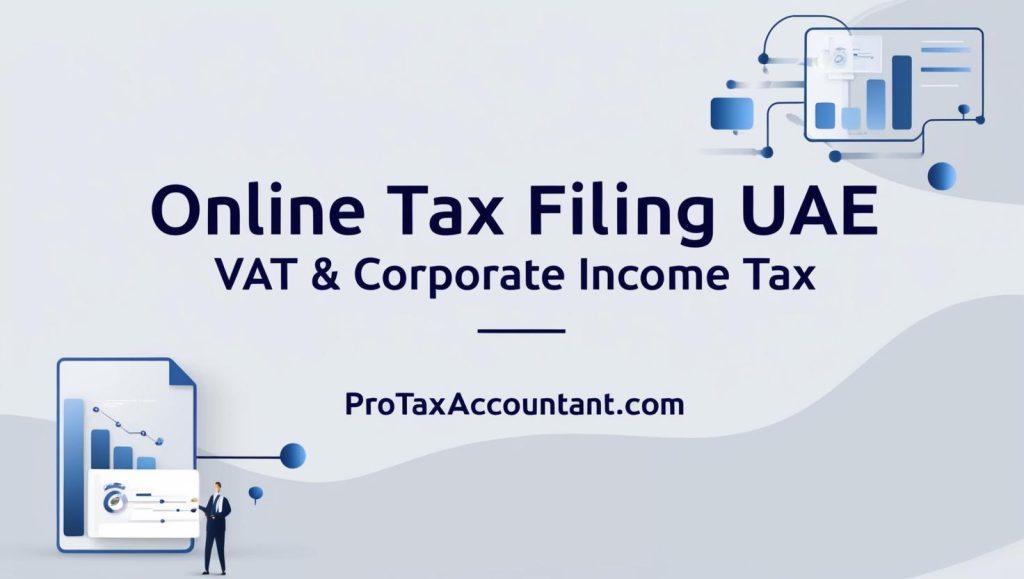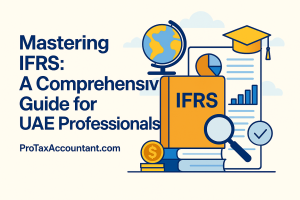Online tax filing in the UAE has become increasingly important for businesses, especially with the introduction of Corporate Income Tax (CIT) and Value Added Tax (VAT).
With the Federal Tax Authority (FTA) mandating digital submissions, understanding the process is crucial to avoid penalties and ensure compliance.
In this blog, we’ll explore the ins and outs of online tax filing in the UAE, focusing on VAT and CIT, while providing actionable tips on cost-saving measures for small businesses.

Understanding VAT in the UAE
What is VAT?
Value Added Tax (VAT) is a consumption tax introduced in the UAE on January 1, 2018. It is levied at a standard rate of 5% on most goods and services.
The implementation of VAT was part of the UAE’s strategy to diversify its economy and reduce reliance on oil revenues.
Did You Know? Over 95% of UAE businesses are now VAT-registered, making it a cornerstone of the country’s tax system.
How to Register for VAT
To register for VAT, businesses must meet specific criteria, including having taxable supplies exceeding AED 375,000. Registration can be done online through the FTA portal. Here’s how:
-
Create an Account: Sign up on the FTA website.
-
Fill Out the Form: Provide business details, including trade license and bank information.
-
Submit Documents: Upload required files like your Emirates ID and Memorandum of Association.
Once registered, businesses must file VAT returns quarterly or annually, depending on their taxable turnover.
Pro Tip: Use our VAT Registration Guide for step-by-step support.
Filing VAT Returns
Filing VAT returns is a straightforward process that can be completed online. Businesses are required to submit their VAT return within 28 days from the end of their tax period. This includes:
-
Reporting all sales and purchases.
-
Calculating VAT owed.
-
Making payments accordingly.
Quote: “The digital filing system allows businesses to manage their tax obligations efficiently and effectively.” – Federal Tax Authority
Need Help? Explore our VAT Filing Services for hassle-free compliance.
Corporate Income Tax (CIT) in the UAE
In January 2022, the UAE announced the introduction of Corporate Income Tax (CIT), which took effect from June 1, 2023.
The standard rate is set at 9%, with a 0% rate applicable to annual taxable profits below AED 375,000.
This move aligns with international best practices and aims to enhance transparency in the business environment.
Who Needs to Register?
All businesses operating in the UAE must register for CIT, including those in Free Zones and foreign entities. Registration is mandatory even for companies with no income.
Fact: Free Zone businesses must confirm their Designated Zone status to benefit from 0% CIT.
How to Register for CIT
Businesses can register for CIT through the EmaraTax portal. The registration process involves:
-
Create an Account: Sign up on EmaraTax.
-
Fill Out the Form: Provide business details, including financial statements.
-
Obtain a TRN: Receive your Tax Registration Number (TRN) from the FTA.
Pro Tip: Use our Corporate Tax Calculator to estimate your liabilities.
Filing Corporate Tax Returns
Once registered, companies must file their corporate tax returns within nine months from the end of their financial year. For instance, a company with a fiscal year ending on May 31 would need to file its return by February 28 of the following year.
Steps to File:
-
Log into EmaraTax using your credentials.
-
Navigate to the corporate tax section.
-
Fill out the tax return form, detailing income and expenses.
-
Submit supporting documents as required.
-
Make payment for any taxes owed.
Proper registration ensures compliance and avoids penalties associated with non-filing.
Benefits of Filing Online
-
Efficiency: Reduces paperwork and speeds up processing times.
-
Cost-Effective: Minimizes administrative costs associated with manual filing.
-
Accuracy: Automated calculations reduce errors in tax submissions.
Businesses using online accounting software save 20+ hours/month on tax prep.
Cost-Saving Tips for Small Businesses
Navigating taxes can be daunting for small businesses; however, there are several strategies to save costs:
-
Utilize Accounting Software: Implementing tools like QuickBooks or Xero can streamline financial management and ensure accurate tax reporting.
-
Stay Informed: Regularly check updates from the FTA regarding changes in tax laws or filing procedures.
-
Engage Professional Services: Consider hiring a tax consultant in Dubai to ensure compliance and optimize tax liabilities.
“Investing in professional services can save you money in penalties and help you take advantage of available deductions.”
Conclusion
Online tax filing in the UAE has transformed how businesses manage their tax obligations, making it easier than ever to comply with VAT and corporate income tax regulations.
By understanding these processes and implementing cost-saving strategies, small businesses can navigate this landscape efficiently.
For expert assistance tailored to your business needs, Pro Tax Accountant provides the best services for small businesses, ensuring compliance while maximizing savings!
More Resources:





